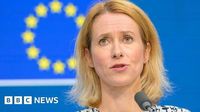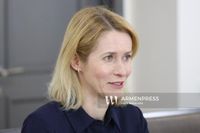In a week marked by high-stakes diplomacy and mounting skepticism, the European Union’s top diplomat, Kaja Kallas, has issued a stark warning against pressuring Ukraine to surrender any of its territory to Russia as part of a peace settlement. Speaking to the BBC in her first UK interview since joining White House talks led by former US President Donald Trump, Kallas described such concessions as a “trap that Putin wants us to walk into,” underscoring deep divisions over the path to peace in the embattled region.
The Donbas region—long a flashpoint in the conflict—remains at the heart of the debate. For more than a decade, Russia’s aggressive maneuvers in eastern Ukraine have displaced 1.5 million people, carving scars into the landscape and its communities. Despite mounting international pressure, Ukraine’s leadership has steadfastly refused to cede the territory. As reported by the BBC, President Volodymyr Zelensky and his government have repeatedly declared there will be no “swapping of territories,” even as Trump has floated the idea as a possible avenue for peace.
Kallas, who serves as the European Union High Representative for Foreign Affairs and Security Policy, didn’t mince words about the risks. “The demand for concessions from Ukraine is a game according to the Kremlin’s scenario,” she told the BBC. She argued that any move to legitimize Russian control over occupied regions would simply fulfill Moscow’s long-standing ambitions and further entrench its grip on Ukrainian land. “We are forgetting that Russia has not made one single concession,” she added, pointing to the absence of meaningful steps from Moscow toward a genuine resolution.
Security guarantees for Ukraine are another sticking point. Kallas emphasized that “the strongest security guarantee is a strong Ukraine army,” suggesting that paper agreements alone would offer little real protection. While she acknowledged the importance of “credible and robust” assurances, she admitted that there were few “concrete steps” for building an effective deterrence force at this stage. Instead, she placed the onus on the so-called “coalition of the willing”—EU member states like France, Germany, Italy, and Finland—to define what support they could offer. “It is up to member states of the coalition of the willing to determine exactly what they can contribute, and it is not yet clear in what capacity those forces would operate,” Kallas explained.
The diplomatic flurry reached a crescendo last week. After Trump hosted Russian President Vladimir Putin at a military base in Alaska—a move that drew sharp criticism from European leaders—Zelensky and key EU heads of state gathered at the White House for urgent talks. According to Kallas, Putin “got everything he wanted” from the Alaska summit: a warm welcome and the avoidance of any new sanctions. “Putin is just laughing, not stopping the killing but increasing the killing,” Kallas said, expressing frustration at what she saw as a lack of meaningful consequences for Russian actions.
In response, the European Union has moved ahead with its 19th package of sanctions targeting the Kremlin, hoping to ratchet up the pressure and force Russia to the negotiating table. But the effectiveness of these measures remains uncertain, especially as doubts swirl around the sincerity of Moscow’s intentions. As reported by the BBC and RBC Ukraine, Trump has set a two-week window—beginning August 21, 2025—to gauge whether any progress can be made in talks between Russia and Ukraine. “I would say within two weeks we're going to know one way or the other,” Trump told Newsmax, hinting at the possibility of a shift in strategy if the deadlock continues.
Yet, skepticism abounds on both sides of the Atlantic. French President Emmanuel Macron pulled no punches, describing Putin as “a predator, and an ogre at our doorstep” who must “continue to feed for the sake of his own survival.” Finnish President Alexander Stubb echoed this distrust, stating bluntly that Putin “can rarely be trusted.” Both leaders, present at the White House discussions, voiced grave doubts that the Kremlin is genuinely interested in a peaceful resolution.
Zelensky, for his part, has made clear his willingness to meet Putin “in any format,” but sees little evidence that Moscow is prepared for substantive negotiations. On August 21, 2025, following a deadly Russian air attack that struck eleven locations across Ukraine—including Lviv near the Polish border, killing at least one and injuring more than a dozen—Zelensky accused Russia of actively avoiding the “necessity” of a leaders’ summit. “Current signals from Russia are, to be honest, indecent. They're trying to avoid the necessity to meet. They don't want to end this war,” Zelensky told reporters, as cited by Agence France-Presse.
The continuing violence only adds urgency to the calls for a robust security framework. “We need to understand which country will be ready to do what at each specific moment,” Zelensky said, pressing Western allies for clarity on the architecture of future guarantees. The lack of defined commitments from coalition partners has left Ukraine in a precarious position, reliant on promises that remain, for now, largely theoretical.
The broader Western response reflects a complex mix of strategic calculation, moral imperative, and political risk. For some, the idea of territorial concessions is anathema—a betrayal not only of Ukraine’s sovereignty but of the postwar European order. For others, the specter of a protracted war, with its attendant costs and risks of escalation, makes compromise an uncomfortable but necessary option. Trump’s willingness to entertain the idea of “swapping of territories” has drawn criticism from both European allies and elements within his own political base, who fear that such a move could embolden autocrats and undermine international norms.
Meanwhile, the EU’s incremental ratcheting up of sanctions underscores both its resolve and its frustration. Nineteen rounds in, the impact on Russia’s calculus remains unclear, with Putin showing few signs of backing down. As Kallas pointed out, “the real guarantee for Ukraine is not paper agreements, but a strong army”—a sentiment echoed by many in Kyiv and across Europe.
As the two-week deadline set by Trump approaches, the world watches with bated breath. Will Russia finally come to the table in good faith, or will the cycle of violence and recrimination continue? For now, the prospects for a breakthrough remain as uncertain as ever, with the fates of millions hanging in the balance.
In this tense and uncertain moment, the stakes could hardly be higher—for Ukraine, for Europe, and for the international order itself.



